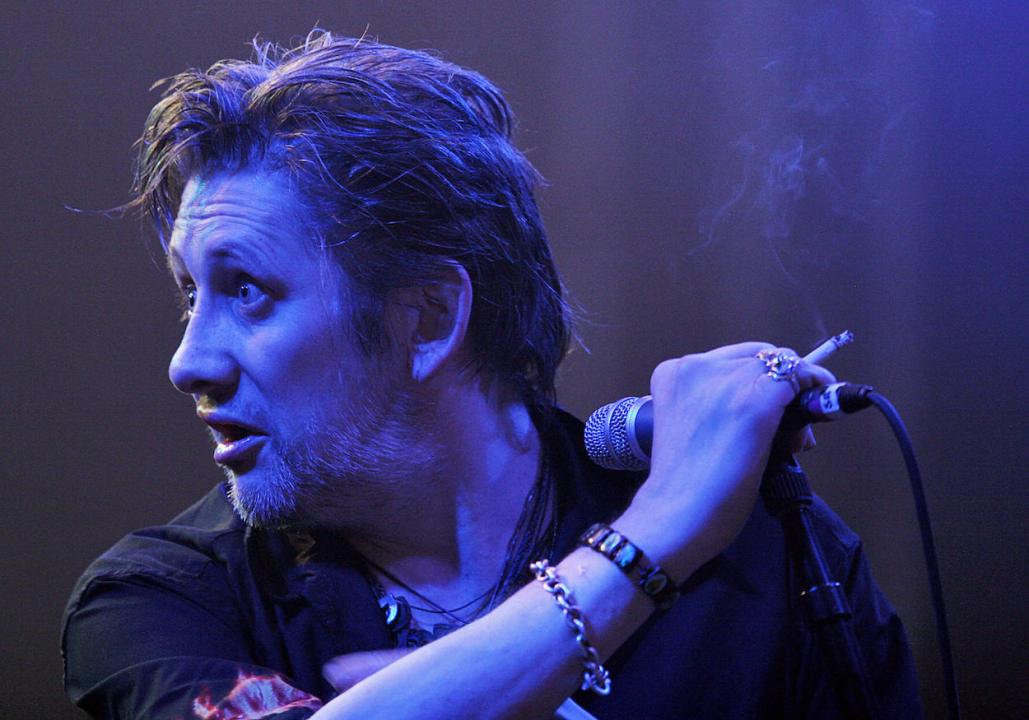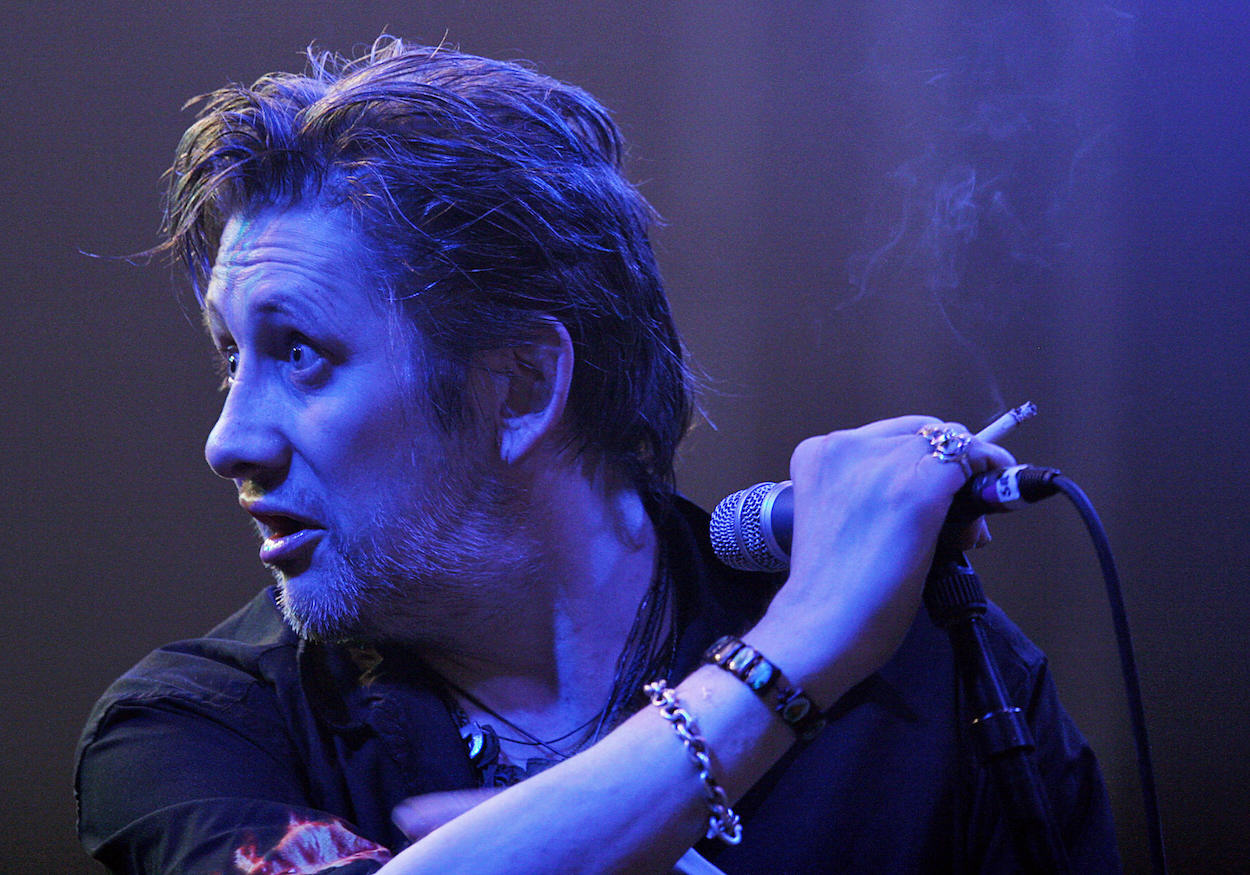Shane MacGowan spent much of his life in pubs, working in them, drinking in them, performing in them – even living in a couple. He would have turned 66 on Christmas Day, state retirement age, so he was only three and a half weeks short of reaching a finishing line of sorts when he died at the end of November.
Perhaps if he’d just stuck to pints, he might have made it. Guinness is, after all, good for you. But there were also spirits. I can’t imagine quite how many shots he drank over seven decades. And it was seven: MacGowan claimed to have had his first Guinness aged four, his first whisky at eight. Drugs soon followed. And then, later, everyone wanted to buy him a drink.
As the band took off, MacGowan was able to afford to live the dream – and move into a pub full time
I began particularly associating him with pubs around the time that ‘Fairytale of New York’ transformed MacGowan into a household name. This was because of an episode that would become famous in my genteel hometown, Tunbridge Wells. Despite being embraced by Ireland, to the extent of being given practically a state funeral, and many recent news reports wrongly attributing him Irishness, it was in this decidedly un-Wild Rover-ish spa town in Kent that MacGowan was born.
And he retained familial connections there – his sister Siobhan lived there for many years – which probably explained why, one night around Christmas time in the late 1980s, Shane rocked up in Tunbridge Wells. He proceeded to have a proper booze-up on The Pantiles, spending the evening in its two pubs, The Duke of York and The Sussex Arms.
The precise details are blurred or lost: it may have been Christmas Eve, or possibly Boxing Day, it might have been 1987 or maybe 1988, he may have bought a round for the entire house or may have quietly ignored everyone. He may have sung a song, ‘The Rare Old Mountain Dew’. Or maybe not.
The only certainty is that more people would later claim to have been there than conceivably could have been, as MacGowan’s visit was transformed into a mythical event for local drinkers: a fairytale of The Duke of York, as it were. I wasn’t there. Which was pretty rotten luck as I spent much of my life at the time in those two pubs.
That’s my personal association then. But The Duke would have been just one among hundreds that he drank in over the years. The first, formative pub for MacGowan I have been unable to identify. So if any readers know its name and fate please do share. All I can find recorded is that it was close to the Ford plant in east London, run by his uncle Frank in the seventies.
‘He was a link with Ireland for me,’ MacGowan would later recall. ‘Frank ran a great pub in Dagenham for the Irish Ford workers, which is what “Sally MacLennane” [a track on The Pogues’s breakthrough album Rum, Sodomy and The Lash] is based on.’
By the time he left school to become a peripheral figure on the punk scene, front man in a band, The Nips, MaGowan was in and out of jobs, squats and trouble – and always pubs. He worked as barman in The Griffin in Villiers Street by Charing Cross. Then, for a spell, he worked in a record shop in Soho and frequented the upstairs bar of The Cambridge on Charing Cross Road.
He and fellow Pogues founder Spider Stacy first met at The Roundhouse in Camden, at the urinal, during a Ramones gig, and for years afterwards the pair drank in The Devonshire Arms – or The Dev, as it was known – up the road, by the old canal. This was a goth-styled musician’s pub later frequented by Amy Winehouse. There’s a mid-1980s interview with Antoine de Caunes filmed there, as if MacGowan is welcoming the camp Frenchman into his home.
MacGowan and Stacy then abandoned The Dev when its soaring popularity meant ‘it was too hard to get to the bar’ – and instead became regulars at The Good Mixer around the corner, another muso’s pub.
Other north London boozers on their crawls were The Lady Owen Arms on Goswell Road in Islington and Molly Malones and later the Auld Shillelagh in Stoke Newington, as well as The George Robey in Finsbury Park. He met his first wife, Victoria Clarke, at the Royal Oak in Golders Green, telling her he was the singer in a new band called Pogue Mahone.
Early band rehearsals were in a pub, The Boston Arms in Tufnell Park. And their early gigs were in pubs too – their debut was in The Pindar of Wakefield (later The Water Rats) on Gray’s Inn Road, Kings Cross. It was an easy gig to land as MacGowan also worked at the pub, collecting glasses and serving behind the bar. Other early gigs were at The Hope and Anchor in Islington and The Bull and Gate in Kentish Town.
In the wake of his death one of the many shared memories was of a joint interview he gave with Mark E. Smith of The Fall and Nick Cave – which, inevitably, turned into a drinking session – at The Montague Arms in New Cross in 1989. These are probably just a fraction of the many alehouses he used to frequent, as the song goes, but then these things aren’t always contemporaneously recorded – as the witnesses had often consumed too much to remember many details afterwards.
My music writer friend Tim, for example, recalls meeting him in a pub in Covent Garden in the early Pogue Mahone days – and MacGowan telling him he had given up punk and was now singing Irish music ‘for a laugh’. ‘What pub was this?’ I asked, ‘no idea,’ Tim replied. Similarly my wife’s cousin Jono, a punk of similar vintage, recalls drunken nights with MacGowan in pubs in Brixton which often ended with MacGowan asleep on his sofa – but can’t recall which specific pubs.
The closest I came to drinking with him was in October 1985 when I was killing an afternoon in Manchester Poly Student Union where The Pogues were playing that night. I was watching the comedy western Pale Face with Bob Hope and Jane Russell alone in the bar when the whole band came in to set up, and to get some liquid refreshment. Elvis Costello, who was dating the band’s bassist Cait O’Riordan, sat down next to me and we tapped feet to ‘Buttons and Bows’. Shane remained aloof at the bar. It was 40p for a pint of lager in the union at the time, I still recall.
As the band took off, MacGowan was able to afford to live the dream – and move into a pub full time. This was the one he remains probably most closely associated with, Filthy McNasty’s, a self-styled Irish ‘whiskey cafe’ close to Sadler’s Wells in Islington. He lived in rooms upstairs and for much of the 1990s would nightly hold court in the bar. A young Pete Doherty, his own wild days still ahead of him, worked behind the bar. By then he was really quite famous so it was almost an alternative tourism event to go to Filthy’s to see him, in the same way you reputedly can these days with Sir Ian McKellen at The Grapes in Limehouse.
I lived nearby for a while, became a semi-regular and saw Shane many times – but always from a respectful, or perhaps wary, distance, in the same way that one might avoid the front rows in a comedy club. From Filthy’s he moved on, along with landlord Gerry O’Boyle, to a similar arrangement at his next boozer, The Boogaloo in Highgate. My friend Steve, then a young news hack living around the corner, recalls ringing the bar just after 11 p.m. to see if they were still serving – not an unusual occurrence, apparently. MacGowan himself answered the phone and told him, Father Jack style, ‘We’re fecking shut’. Another journalist friend, Sean, sent to interview him at The Boogaloo, recalls trying to keep up with and show off to MacGowan, which led to him drinking a pint of sake and promptly collapsing. MacGowan paid for his cab home.
Just as a lot of this history wasn’t ever formally recorded, many of the places where it happened have disappeared too. The Lady Owen Arms was demolished in 1998 to make way for flats, Molly Malones went the same way the following year, The Royal Oak closed in 2006 and is now a clothes shop, The George Robey was demolished in 2015, The Griffin was renamed The Bell and Compasses and then closed as a pub and became a Café Rouge, The Montague Arms remains empty after closing five years ago and Filthy’s closed in 2013 and is now gastro pub rebranded as The George and Monkey.
The singer had an affinity for pubs – as they did for him, in the sense that the presence of a MacGowan character in a pub let’s you know it is a pub, and not, say, a branch of Costa. Like the old man in his most famous song, MacGowan won’t see another Christmas. But a lot of people will be raising a glass to him on his birthday, including me. Cheers, Shane.







Comments